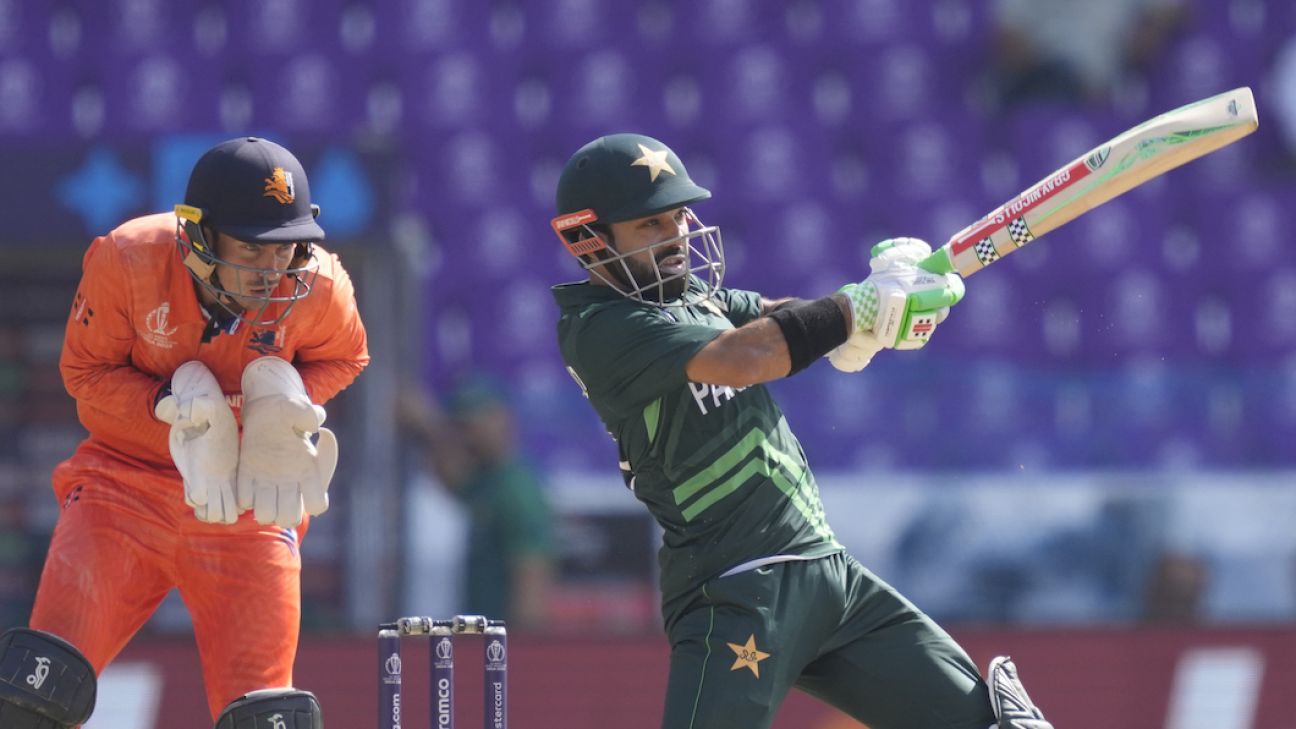In only his seventh ODI, Shakeel scripted Pakistan’s turnaround from 38 for 3 with a century stand with Rizwan. Shakeel was the aggressor, stroking a 32-ball half-century that Rizwan enjoyed from the best seat in the house, the non-striker’s end.
Such was the captivating effect Shakeel’s knock had on him that Rizwan stopped talking plans and strategies halfway through their partnership, instead just reveling in Shakeel’s spell of batting that took the game away from Netherlands after they were rocked early.
“If Saud maintains the hard work he’s doing, then Pakistan will have found themselves another superstar,” Rizwan said. “Because he’s a bit different in the way he’s gifted. While I plan or discuss batting with Babar Azam in a partnership, when I bat with Saud I tell him I’m not planning anything with him, because the way he plays his shots get him runs anyway.
“If he plays like he normally does, he’ll be fine and score quickly. But he has gifts that make him a different kind of superstar. We had said that we’d start to plan after 33 overs for the final stages of the innings. But then he got out a little short of 33 overs, and so did I (laughs).”
Rizwan bats at a pivotal position, No. 4, one that Pakistan hadn’t entirely nailed down leading into the World Cup. One game in, it’s one position that should perhaps be written in stone. Rizwan’s T20 batting can at times invoke a sense of anguish within those who follow him closely, but there’s a proper method to his ODI approach that resonates calmness and comfort within the dressing room.
It’s one that he feels has come about because of a firm understanding of his game that stems from putting himself through conditions-specific training which, in turn, helps him develop a sense of assessing conditions quickly.
“Cricket is condition specific. Sometimes within a match itself, conditions change,” he explained. “Sometimes it starts off as a flat pitch, then starts seaming [under lights]. Sometimes it takes turn. Prior to coming here, I’d phoned Saeed Anwar. He spoke of the same thing, how it’s important to read conditions well.
“It’s not like pitches are always flat in India, yes, it’s good for batting but there is some help for spin and seamers. If you watched England versus Bangladesh, it seamed and swung a great deal. You saw today, how Haris Rauf was breathing fire and hitting some late seam movement. So we have to train specific to conditions.”
“Yes, it’s a good question,” he started with a laugh. “But you also have to understand, the last two years, the reason for us becoming No. 1 was our top three. Just before the Asia Cup, Fakhar Zaman was named the ICC Player of the Month. Before that, Imam had hundreds upon hundreds. We think this is an opportunity for the middle order to showcase its form. And now the middle order is also performing.
“The good sign for Pakistan is now we’re not only dependent on the top three, with contributions from the rest of the top seven coming too. I think proper teams don’t depend on one or two players. It’s much better when the whole team performs, so we’re happy with how it’s working out.”
Is there any area that he feels Pakistan haven’t quite hit top gear?
“Yes, one challenge, one box we haven’t ticked. Fielding,” he said. “It’s gotten better, today we were very good, but I feel we need to go that level. If you have to become champions, we have to do champion things. We have to still improve further.”
Shashank Kishore is a senior sub-editor at ESPNcricinfo
